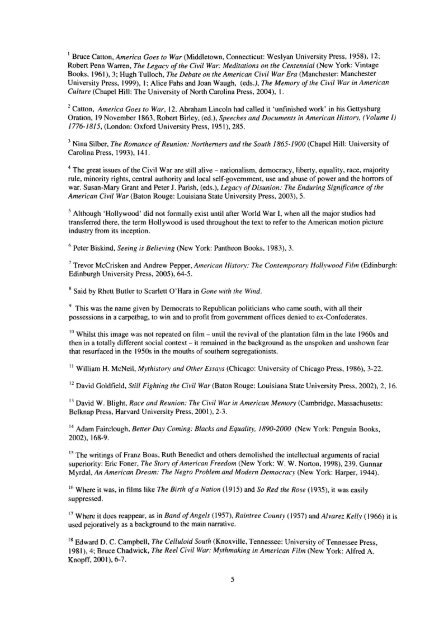Download (3483kB) - Greenwich Academic Literature Archive ...
Download (3483kB) - Greenwich Academic Literature Archive ...
Download (3483kB) - Greenwich Academic Literature Archive ...
- No tags were found...
Create successful ePaper yourself
Turn your PDF publications into a flip-book with our unique Google optimized e-Paper software.
1 Bruce Catton, America Goes to War (Middletown, Connecticut: Weslyan University Press, 1958), 12;Robert Penn Warren, The Legacy of the Civil War: Meditations on the Centennial (New York: VintageBooks, 1961), 3; Hugh Tulloch, The Debate on the American Civil War Era (Manchester: ManchesterUniversity Press, 1999), 1; Alice Fahs and Joan Waugh, (edsj, The Memory of the Civil War in AmericanCulture (Chapel Hill: The University of North Carolina Press, 2004), 1.2 Catton, America Goes to War, 12. Abraham Lincoln had called it 'unfinished work' in his GettysburgOration, 19 November 1863, Robert Birley, (ed.), Speeches and Documents in American History, (Volume I)1776-1815, (London: Oxford University Press, 1951), 285.3 Nina Silber, The Romance of Reunion: Northerners and the South 1865-1900 (Chapel Hill: University ofCarolina Press, 1993), 141.The great issues of the Civil War are still alive - nationalism, democracy, liberty, equality, race, majorityrule, minority rights, central authority and local self-government, use and abuse of power and the horrors ofwar. Susan-Mary Grant and Peter J. Parish, (eds.), Legacy of Disunion: The Enduring Significance of theAmerican Civil War (Baton Rouge: Louisiana State University Press, 2003), 5.5 Although 'Hollywood' did not formally exist until after World War I, when all the major studios hadtransferred there, the term Hollywood is used throughout the text to refer to the American motion pictureindustry from its inception.6 Peter Biskind, Seeing is Believing (New York: Pantheon Books, 1983), 3.Trevor McCrisken and Andrew Pepper, American History: The Contemporary Hollywood Film (Edinburgh:Edinburgh University Press, 2005), 64-5.8 Said by Rhett Butler to Scarlett O'Hara in Gone with the Wind.9 This was the name given by Democrats to Republican politicians who came south, with all theirpossessions in a carpetbag, to win and to profit from government offices denied to ex-Confederates.10 Whilst this image was not repeated on film - until the revival of the plantation film in the late 1960s andthen in a totally different social context - it remained in the background as the unspoken and unshown fearthat resurfaced in the 1950s in the mouths of southern segregationists.11 William H. McNeil, Mythistory and Other Essays (Chicago: University of Chicago Press, 1986), 3-22.12 David Goldfield, Still Fighting the Civil War (Baton Rouge: Louisiana State University Press, 2002), 2, 16.13 David W. Blight, Race and Reunion: The Civil War in American Memory (Cambridge, Massachusetts:Belknap Press, Harvard University Press, 2001), 2-3.14 Adam Fairclough, Better Day Coming: Blacks and Equality, 1890-2000 (New York: Penguin Books,2002), 168-9.15 The writings of Franz Boas, Ruth Benedict and others demolished the intellectual arguments of racialsuperiority: Eric Foner, The Story of American Freedom (New York: W. W. Norton, 1998), 239. GunnarMyrdal, An American Dream: The Negro Problem and Modern Democracy (New York: Harper, 1944).16 Where it was, in films like The Birth of a Nation (1915) and So Red the Rose (1935), it was easilysuppressed.17 Where it does reappear, as in Band of Angels (1957), Raintree County (1957) and Alvarez Kelly (1966) it isused pejoratively as a background to the main narrative.18 Edward D. C. Campbell, The Celluloid South (Knoxville, Tennessee: University of Tennessee Press,1981), 4; Bruce Chadwick, The Reel Civil War: Mythmaking in American Film (New York: Alfred A.Knopff, 2001), 6-7.
















